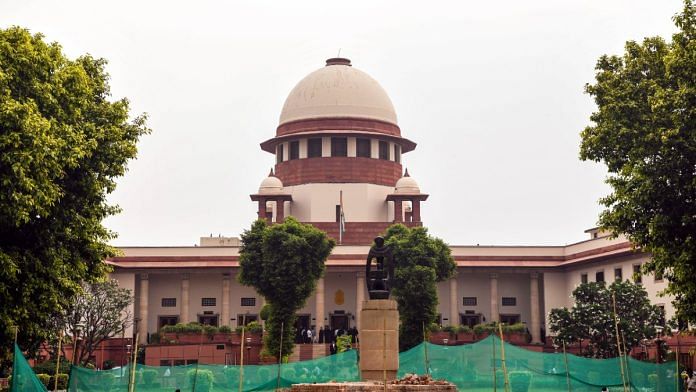New Delhi: National Conference leader and Lok Sabha MP Mohammad Akbar Lone Tuesday filed a one-page affidavit, affirming that he is a “responsible and dutiful citizen of the Union of India”. His affidavit came on the 16th day of the hearing in the Article 370 case, with a five-judge Constitution Bench finally wrapping up the proceedings.
The bench, led by Chief Justice D.Y. Chandrachud and also comprising justices S.K. Kaul, Sanjeev Khanna, B.R. Gavai and Suryakant, reserved its verdict on petitions against abrogation of the said Article as well as bifurcation of J&K into two Union Territories.
Hearing in the case had commenced on 2 August, three years after the Supreme Court issued notices on the petitions. Lone is one of the petitioners who challenged the amendments made to Article 370 and the subsequent bifurcation of Jammu and Kashmir.
On Monday, the top court had asked him to file an affidavit, stating that he “owes allegiance to the Constitution of India and that J&K is an integral part of India”.
The direction came after an NGO of displaced Kashmiri pandits, Roots in Kashmir, brought to the court’s notice an instance from 2018 when Lone purportedly raised anti-India slogans during a session of the J&K legislative assembly.
The NGO argued that Lone could not be allowed to agitate over abrogation of Article 370, especially after publicly supporting Pakistan. Its contention found support from Solicitor General Tushar Mehta on whose insistence the court directed Lone to file the affidavit.
Stating that he was exercising his right under Article 32 (which allows a citizen to approach the top court directly), Lone in a one-page affidavit stated, “I reiterate the oath taken while being sworn in as the members of Parliament to preserve and uphold the provisions of the Constitution of India and to protect the territorial integrity of the Nation.”
Mehta expressed his dissatisfaction with the affidavit and demanded that Lone also clarify in the affidavit that he “does not support terrorism or any separatist activity”. The solicitor general added that no citizen “can logically say” that they support terrorism.
He also said that Lone’s affidavit added “insult to injury to the nation” and urged the bench to make some observations regarding his conduct. “Your lordships may read what is not written,” he told the bench, which said it would analyse the affidavit later.
Also Read: Ready to hold elections in J&K but no timeline on statehood restoration, Modi govt tells SC
What petitioners told Supreme Court
In the first nine days of the hearing, the petitioners made their submissions, stressing on J&K’s unique status and its relationship with India, which it acquired after its accession.
They argued that Article 370, in its original form, highlighted this relationship, and that the provision could not be altered because it had taken a permanent character after the dissolution of the Jammu and Kashmir Constituent Assembly in 1957.
According to the petitioners, Parliament could not have modified the Article without the approval of the J&K Constituent Assembly, which no longer exists. Parliament, they argued, could not convert itself into a Constituent Assembly for Jammu and Kashmir.
Another constitutional issue raised was the misuse of Article 356 under which President’s Rule can be imposed in any state of India when there is a breakdown of constitutional machinery there. J&K was under President’s Rule when Article 370 was abrogated.
The petitioners argued that President’s Rule is a stopgap arrangement before a proper government assumes charge in the state. Hence, no permanent actions vis-à-vis that state — such as the abrogation and bifurcation — can be taken under such a rule.
The third point of contention, which the petitioners addressed, was on the creation of two UTs out of a state. The Constitution, through Article 3, permitted alteration of state boundaries and not the conversion of the entire state into a UT.
A Union Territory, they said, can be carved out only from a state.
What Centre told Supreme Court
On its part, the Centre defended its move on Article 370 on the basis of the “positive developments” in J&K. The Jammu and Kashmir Reorganisation Bill, 2019, it said, resolved the “psychological duality” of the people living there.
Makers of the Constitution, it submitted, foresaw Article 370 as a temporary provision and “wanted it to die”. It was also stated that J&K was only temporarily converted into a UT owing to it being a sensitive border state, and that its statehood would be restored.
Therefore, even if the J&K Constituent Assembly had been in existence, it would have a limited role to play in the abrogation of Article 370 as its decision would be only “recommendatory” in nature and the President’s decision would be final even if the J&K Constituent Assembly did not agree with it, the Centre argued.
(Edited by Amrtansh Arora)
Also Read: ‘Is there timeframe in view?’ — SC asks Centre for roadmap on restoring J&K statehood



